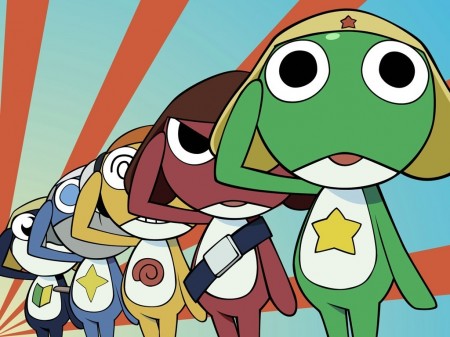Ask John: What Does Pokopen Mean?

Question:
I have recently gotten into the Keroro Gunso anime and manga. Before I got into the series though, I read there was controversy surrounding the series for the manga’s use of the word “Pokopen.” The only information I have on the word is that it is a derogatory term used used by the Japanese against the Chinese during the Sino-Japanese War. My own translation from the Character Guide comes out as “earth human” or “earth person.” So, basically, who first came up with this term, what does it mean, and importantly what was Mine Yoshizaki’s intent in using this word in the Keroro Gunso manga?
Answer:
I’m neither a Japanese speaker nor an expert in the language. I also know little about mangaka Yoshizaki Mine apart from his creations. I’ll provide what information I can because this is a fascinating question. But I need to explain in advance that my knowledge in this area is limited.
My understanding is that the Japanese word pokopen, drawn primarily from the word’s Japanese Wikipedia page, is that it was primarily used during the 1894-1895 first Sino-Japanese war as a demeaning reference to the Chinese. The Japanese word meaning “torunitaranai” (“worthless”), “kudaranai” (“good-for-nothing”), or “dame dame” (“no good” or “stupid”) was a corrupted adoption of the Chinese word “búgòuběn” meaning “having just below the amount of money necessary.” Because of its demeaning, racially insensitive origin and meaning, the word “pokopen” has been practically expunged from modern Japanese language.
The Japanese word “kero” is the onomatopoetic sound of a frog’s croak. Anime fans may be familiar with its use in manga/anime titles including Kero Kero Chime and Keroro Gunso – both series that revolve around frog characters. Yoshizaki Mine’s Keroro Gunso makes extensive use of rhythmic and onomatopoetic sounds, particularly in names including Keroro, Tamama, Giroro, Kululu, Dororo, Sumomo, and Pururu. The Keroro Gunso story involves aliens from the planet Keron attempting an invasion and take-over of Earth. The Keron aliens perceive themselves as a race superior to humans, and their military hierarchy loosely reflects that of the Japanese army during the early 1900s. In keeping with the naming scheme of the Keron aliens, they dismissively refer to Earth as “Pokopen,” literally something worthless for them to take over. Since the word pokopen has been practically banned in Japanese media, the anime retained the concept but changed the literal word to the made up name “Pekopon.”
In 2005 the Keroro Gunso manga was awarded the 50th annual Shogakukan Manga Award for children’s manga. Its anime adaptation is among Japan’s most successful and most watched contemporary shows, particularly among children and families. Keroro creator Yoshizaki Mine has also created the Arcade Gamer Fubuki manga/anime, and is well known for his original mascot character OS Idol Win-chan and providing character designs for the Seven of Seven anime television series, Konami’s long running Twinbee game franchise, and the Otomedius arcade shooting game. As far back as his earliest manga work, there’s nothing in Mine’s career that suggests he’s ever tried to advance an overt political agenda or philosophy. I think that Mine seized upon the word pokopen because it coincidentally ideally suited the sound and purpose of a word he needed his Keroro Gunso characters to use. Rather than remind readers of an unpleasant time in Japanese historical foreign relations or reinvigorate institutional Japanese racism, I think that Mine’s intention was exactly the opposite. The parallel between the Keron invasion squad and the Japanese military invasion of China during WWII seems like an obvious parody. As if being subtely apologetic, the Keron invasion symbolizes the foolishness and inhumanity of trying to invade and take over a massive territory and culture with a small military force. However, by treating his Keron alien characters as good-natured heroes, Mine still respects the historical Japanese soldiers who dutifly carried out the orders given to them.
Sunrise Animation’s decision to change the original manga’s “pokopen” to “pekopon” may have been necessitated by Japanese broadcast laws. The change may also have been instituted to avoid potential controversy. However, whether referring to the manga’s use of “pokopen” or the anime’s use of “pekopon,” I believe that the intention is to appropriately employ a term that sounds natural in the context of the narrative and serves a practical and necessary function in the narrative. I’m sure that it wasn’t pure accident that Yoshizaki Mine included the word “pokopen” in his manga story but I don’t see any reason to believe that he did so in order to willfully arouse anti-Chinese sentiments.
Article updated on September 2, 2009
Add a Comment
You must be logged in to post a comment.

